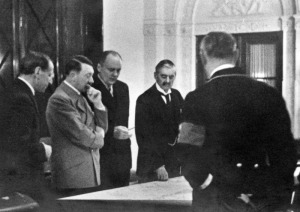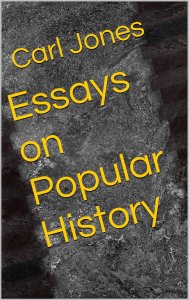September 2013 marked 75 years since the Munich crisis and the culmination of the appeasement policy that would eventually destroy the reputation of British Prime minister Neville Chamberlain. Why did he dogmatically pursue such a ruinous policy?
Appeasement is a thorny subject in British history; it evolved from a policy that set out to address justifiable grievances from the Versailles Treaty but became tinged with the perception of a policy of cowardice. It moved from attempting to redress the imbalance of the Versailles Treaty to avoiding the potential for conflict at almost any cost by not confronting acts by dictatorial powers that were outside of existing treaty obligations. The idea of appeasement was not specific to the era of the 1930s, Jan Smuts in his letter to Lloyd George in 1919 wanted to avoid crippling Germany, “her appeasement now may have the effect of turning her into a bulwark against the oncoming Bolshevism of Eastern Europe” (1). It was a policy that hoped to avoid a repetition of the horrors of the Great War by stopping belligerent foreign policies at source through mediation and negotiation. The treaty left open a potential for revanchist sentiments within Germany. Later the Locarno Treaty, which intended to revise aspects of Versailles, merely served to further exacerbate the inequalities inherent within it. Subsequently they became a contributing factor towards the unsettling effects of Nazism and the need for a policy of appeasement.

Neville Chamberlain, despite not being responsible for the instigation of it, is the person most synonymous with the policy. His attempts to extend an olive branch to Hitler only served to convince the German leader of the inherent weaknesses of the democratic powers. Was this policy really the manifestation of decaying decadent western powers scarred by First World War experiences? Was appeasement an attempt to redress the inequalities and injustices of Versailles via peaceful solutions that stayed as close to the spirit of previous international treaty commitments as possible? Subsequently the policy of appeasement became a contentious historical debate splitting observers into two camps, one seeing at as a craven act of capitulation the other as a brave peace of realpolitik that bought Britain valuable time for rearmament. Chamberlain became the near physical embodiment of the policy and pursued it with such vigor that it could be argued he engineered a controversy over Abyssinia and Italy to remove Eden as foreign minister and bring in a more compliant minister to pursue his policies.
The most notorious episode was the Munich crisis, despite being initially greeted with enthusiasm as it averted the potential for war. The capitulation there stigmatized the Conservative party as the men of Munich to such an extent that it contributed to the post war defeat of Churchill despite him being a national hero and one of the most vocal opponents of the policy. There is very little middle ground in terms of historical debate over appeasement, Antony Lentin attempted to restore something of Chamberlain’s reputation observing that: “Contrary to a popular image of weakness, Chamberlain was a strong and tenacious Prime Minister” (2) and that his policy was misconceived or ill-considered, rather than being that of a coward. Perhaps Chamberlain had hoped it would lead to an Anglo-German entente that would act as a block against Bolshevism. His apologists, such as AJP Taylor, saw Munich as a necessary evil that put right the inconsistencies of Versailles describing it as a “triumph for British policy” (3). Britain was not in a position to fight a continental war at this time and after the Anschluss it was being accepted that “The new strategical situation increased the doubts of her former friends that Czechoslovakia could survive” (4).

It has been questioned it as an act of realpolitik, Lentin (in something of an about turn) made the point that “Chamberlain wanted permanent peace, not postponement of war” (5). This view would certainly back the argument that appeasement was an act of weakness that was a direct contributing factor to the outbreak of the Second World War. The failure to stand up to Hitler led to an increase in European tensions that convinced Mussolini and Stalin of the weakness of the democracies and that siding with Hitler for either long or short term reasons was the best cause of action. The capitulation of Munich was perhaps the final nail in the coffin of peace, convinced of the weakness of France and the inability of Britain to commit to a treaty with the Soviet Union, Stalin came to terms with Germany over Poland that allowed Hitler a free reign in the East, as Lentin observed “After Munich, Hitler cast off all restraint” (6).
Appeasement became a symbol of weakness as a consequence of this; as a policy it was one that had the best of intentions that was based on the realities of the limitations of the participants but was in reality fundamentally flawed. Appeasement fell down through two factors. One was the naivety of Chamberlain who took Hitler at his word believing the Sudetenland “to be the limit of the German aims” (7) and that he would turn to negotiation without the threat of force. It is difficult to understand how Chamberlain could be surprised at the opportunist nature of German foreign policy, given the opportunistic nature of Hitlers domestic policies and when Chamberlain himself could be equally as cynical regarding the preservation of Czechoslovakia. Roberts noted that Chamberlain sought to “stabilize Europe for the foreseeable future, he saw Czechoslovakia only as a tiresome obstacle” (8). The other factor was the British insistence upon peaceful conclusions to tensions regardless of the consequences. In such a situation any nationalist leader worth his salt, let alone a supreme exploitative opportunist such as Hitler, would have been able to “exploit the almost universal popular desire for peace in France and Britain and the weakness of their governments” (9).

In such conditions appeasement could only delay the inevitable and that was not what Chamberlain wanted and the more he pushed through the concessional policy the more he became inexorably linked with appeasement and the failings within it. In his defence he tied in with the contemporary public opinion and the government had set out with the best of intentions to prevent a repeat of the horrors of trench warfare and redress justifiable grievances. He was also backed by the USA ambassador Kennedy in pursuing the policy. It was only with the evolution of the policy from Locarno through to Munich that it became a policy synonymous with weakness that would lead to the very thing it sought to avoid. As a result appeasement was in essence a craven policy with caveats governed by contemporary considerations.
1) Open University, aa312, Primary Sources 1, Document 1.20, p. 64 (2000)
2) Open University, aa312, Unit 19, p. 227 (2000)
3) Taylor, quoted in, Open University, aa312, Unit 19, p. 231 (2000)
4) Roberts, p. 432 (2001)
5) Open University, aa312, Unit 19, p. 219 (2000)
6) Open University, Unit 19, p. 233 (2000)
7) Roberts, p. 433 (2001)
8) Roberts, p. 432 (2001)
9) Roberts, p. 415 (2001)
BIBLIOGRAPHY
Primary Sources
Marwick, A., Emsley, C. and Mombauer, A. (eds.) (2000) Primary Sources 1: World War I, Milton Keynes, The Open University
Secondary Sources
Lentin, A. (2000) ‘Unit 19: The Origins of World War II’ in AA312 Book 3, Between Two Wars, Milton Keynes, The Open University
Roberts, J.M. (2001) Europe 1880–1945, third edition, Harlow, Longman





